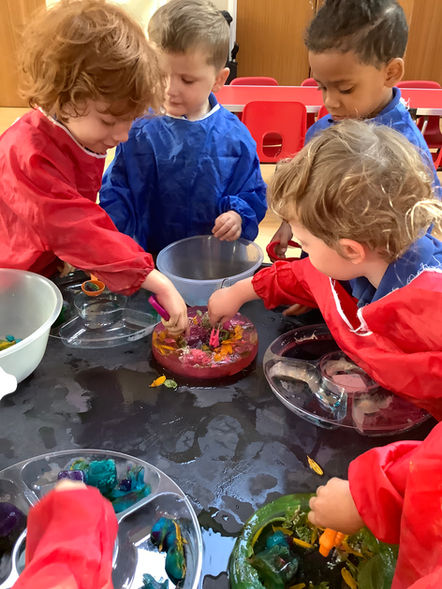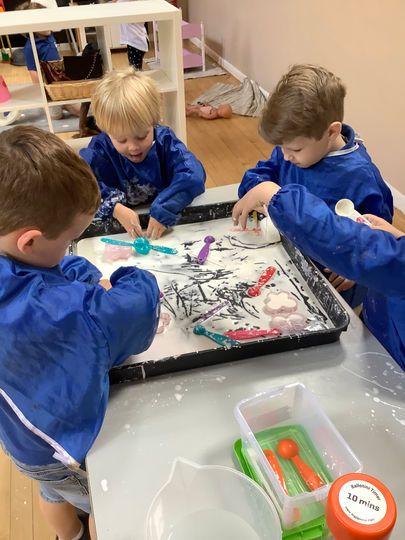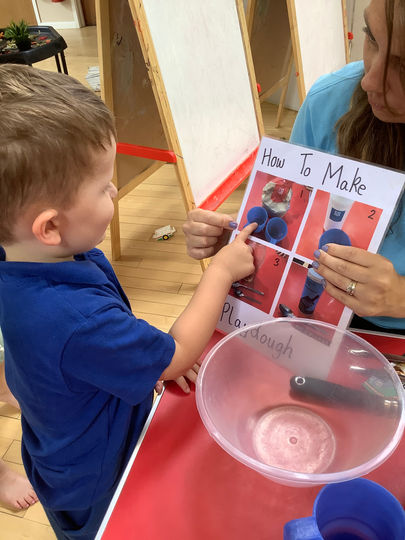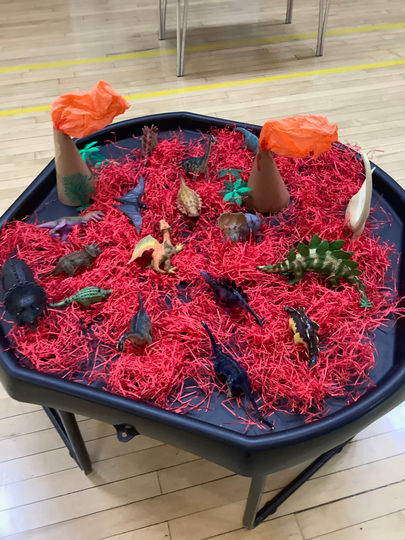
Our Curriculum
Meaningful, purposeful learning for life
The Early Years Foundation Stage Curriculum (EYFS) sets out specific guidance related to ratios, health and safety provision and areas of learning and sets out our legal obligation as a registered provider.
We have created our unique OBVNS curriculum with the EYFS as its foundation; building on top of this unique values, ethos and learning approach. The only statutory requirement with regards to reporting to parents are the 2 year progress check and the Reception Baseline Assessment. However, we know that feedback to parents is important and therefore choose to also report to our parents in the form of a ‘snapshot’ once per term (once a child has fully settled into nursery school life).
There are 3 strands to our curriculum at OBVNS, these sit under an umbrella of ‘meaningful, purposeful, learning for life:
Meaningful, purposeful learning for life
Child | Cohort | Wider Nursery School Values & Traditions |
|---|---|---|
All about me | The characteristics of an OBVNS learner | Themed days |
Settling in posts | (formerly known as our curriculum milestones) | Traditions (e.g. Christmas play) |
Wow moments | Whole setting visits/visitors | |
Snapshots |
These 3 strands form the foundations for all that we do with our little ones. These strands, alongside the 7 areas of learning, are interwoven throughout each and every experience your little one has in their journey with us . Before putting any ideas or plans into action we consider the purpose for learning and the impact of the learning on our little ones. We love seeing our curriculum unfold and evolve throughout the year and particularly enjoying seeing our OBVNS learners develop during their time with us and beyond!
Having the children grouped in school cohorts means they are able to identify with a group of children their age from the very beginning - forming strong bonds with children their age who they will be with throughout their time in Nursery School (and beyond).
These distinct cohort groups allow us to thoroughly prepare them for their school experience particularly during their last final few terms before they begin school.. The children commencing school in September 2024 are referred to as "Fledglings," those beginning in September 2025 are known as "Little Owls," those starting school in 2025 or later are categorized as "Owlets," and finally, the youngest cohort are called "Nestlings."
Despite being grouped, we value mixed aged interactions and provide plenty of opportunities for our children to mix across the age ranges for various activities and experiences depending on what they are doing.
Cohort Groups
So how do our OBVNS practitioners plan a curriculum underpinned by the EYFS?
Key Workers and Pen Portraits
Each child has two key workers. Your child’s team of key workers spend the first half-term (following your child’s enrolment) developing what is called a ‘pen picture’ or ‘pen portrait’ of your child.
These pen portraits provide us with a rich spider diagram of your child’s likes and dislikes, family members, religion and beliefs, cultural celebrations, where your child lives and the experiences your child has already - it is our way of really getting to know your child as they enter our setting!
We will ask you lots of questions about your child as they settle in and work with you closely to ease them into their new surroundings. Your child will be assigned key teams at the end of their settling in period.
Staff recognise how to support all children, including those with SEND, through incisive planning and knowledge of the children’s needs. As a result, children make outstanding progress from their starting points.
Ofsted 2021

Bespoke Cohort Curriculum Planning
Our team meets at the end of your child’s first half-term to plan a bespoke curriculum for them within their cohort group. These plans cover the time between entry and your child starting school and are made up of:
-
Specific trips, visits and experiences we feel your child would enjoy or benefit from
-
Activities / provocations that could be used as a ‘hook’ to support them in given areas of learning
-
Any group sessions that may benefit your child or their cohort - this could be speech and language support, social communication groups, social skills games (such as learning how to take turns)
-
Festivals / national celebration days / local events / family traditions are planned into the calendar- we may ask you to support us with sharing these types of cultural events










Our learning environment is our greatest teaching tool. We are constantly evaluating the environment to see what’s missing, what could be changed, whether we have any additional resources we can bring out - could we set up a provocation to really hook them in or it may be that less is more and we need to reduce the amount of resources in order to help children to select their own tools for play.
This is why OBVNS changes by the term or by the year - it changes to reflect the needs of the children in our care at that time and evolves to meet their needs as they develop. Everything has its place so that a child can truly initiate their own learning and knows where to access the resources they need to extend an idea.
Our Environment
We give out ‘Wow’ stars when a child has achieved something for the first time or overcome a barrier. These can be in any area of learning and are celebrated in nursery.
We encourage parents to let us know whether there has been a ‘Wow’ moment at home - this might be using the potty for the first time or learning to ride a bike. Let us know via Famly by sending an ‘observation’ with a photograph.
Wow Stars














